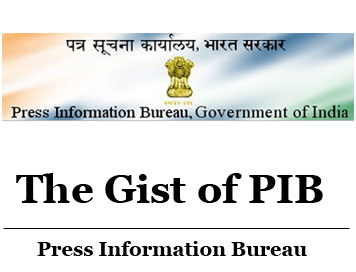(THE GIST OF PIB) Ethanol Blended Petrol Programme

(THE GIST OF PIB) Ethanol Blended Petrol Programme
[April-2022]
Ethanol Blended Petrol Programme
- The Minister of State for Petroleum and Natural Gas Shri Rameswar Teli in a written reply to a question in the Rajya Sabha informed that the Government is promoting Ethanol Blended Petrol (EBP) Programme with broader objectives of providing boost to domestic agriculture sector, environment benefits, reducing import dependency and savings in foreign exchange.
- Government has also notified the National Policy on Biofuels – 2018 which laid out indicative target of 20% blending of ethanol in petrol and 5% blending of biodiesel in diesel by 2030 in the country.
- Based on the encouraging initiatives on supply side of ethanol, Government has advanced the target of 20% blending of ethanol in petrol from 2030 to 2025-26.
About Ethanol:
- Ethanol, an anhydrous ethyl alcohol having chemical formula of C2H5OH, can be produced from sugarcane, maize, wheat, etc which are having high starch content.
- In India, ethanol is mainly produced from sugarcane molasses by fermentation process.
- Ethanol can be mixed with gasoline to form different blends.
- As the ethanol molecule contains oxygen, it allows the engine to more completely combust the fuel, resulting in fewer emissions and thereby reducing the occurrence of environmental pollution.
Background:
- The Ethanol Blended Petrol (EBP) programme was launched in January, 2003 by the Ministry of Petroleum and Natural Gas.
- The programme sought to promote the use of alternative and environment friendly fuels and to reduce import dependency for energy requirements.
- Government of India through Oil Marketing Companies (OMCs) is implementing Ethanol Blended Petrol (EBP) Programme, wherein ethanol is being blended in petrol.
- The Ministry of Petroleum & Natural Gas in 2019 directed Oil Marketing Companies (OMCs) to sell 10% ethanol blended petrol as per Bureau of Indian Standards (BIS) specifications.
- It is being implemented throughout the country except Union Territories of Andaman Nicobar and Lakshadweep islands.
- The National Biofuel Policy 2018 envisages an indicative target of 20% blending of ethanol in petrol and 5% blending of biodiesel in diesel by 2030.
Objectives of EBP:
- Reducing import dependence
- Promoting clean fuel
- Providing boost to agriculture
- Conserving foreign exchange.
Government interventions to increase production of ethanol:
To increase indigenous production of ethanol the Government since 2014 took multiple interventions like,
- Allowing use of sugarcane and food grains (maize and surplus stocks of rice with Food Corporation of India) for conversion to ethanol
- Re-introduction of administered price mechanism
- Opening of alternate route for ethanol production
- Amendment to Industries (Development & Regulation) Act, 1951 which legislates exclusive control of denatured ethanol by the Central Government for smooth movement of ethanol across the country
- Reduction in Goods & Service Tax (GST) on ethanol meant for EBP Programme from 18% to 5%;
- Differential ethanol price based on raw material utilized for ethanol production;
- Extension of EBP Programme to whole of India except islands of Andaman Nicobar and Lakshadweep wef 01st April, 2019;
- Interest Subvention Scheme for enhancement and augmentation of the ethanol production capacity by Department of Food and Public Distribution (DFPD);
- Publication of Long-Term Policy on ethanol procurement.
CLICK HERE TO DOWNLOAD FULL PDF
CLICK HERE TO DOWNLOAD UPSC E-BOOKS
Study Material for UPSC General Studies Pre Cum Mains
Get The Gist 1 Year Subscription Online
Click Here to Download More Free Sample Material
<<Go Back To Main Page
Courtesy: PIB

